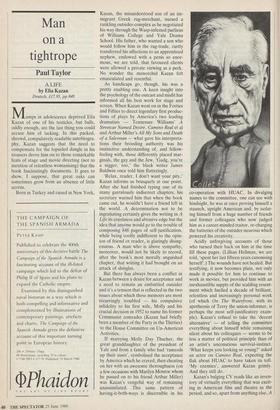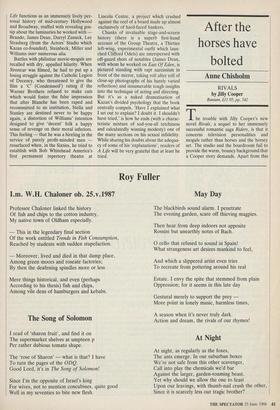Man on a tightrope
Paul Taylor
A LIFE by Elia Kazan
Deutsch, £17.95, pp.848
Mumps in adolescence deprived Elia Kazan of one of his testicles, but balls, oddly enough, are the last thing you could accuse him of lacking. In this packed, shrewd, compulsively readable autobiogra- phy, Kazan suggests that the need to compensate for the lopsided dangle in his trousers drove him on to those remarkable feats of stage and movie directing (not to mention of relentless womanising) that the book fascinatingly documents. It goes to show, I suppose, that great oaks can sometimes grow from an absence of little acorns.
Born in Turkey and raised in New York, Kazan, the misunderstood son of an im- migrant Greek rug-merchant, nursed a rankling outsider-complex as he negotiated his way through the Wasp-infested purlieus of Williams College and Yale Drama School. His father, who wanted a son who would follow him in the rug-trade, curtly transferred his affections to an apprenticed nephew, endowed with a penis so enor- mous, we are told, that favoured clients were allowed a private viewing as a perk. No wonder the monorchid Kazan felt emasculated and resentful.
As handicaps go, though, his was a pretty enabling one. A keen insight into the psychology of the outcast and misfit has informed all his best work for stage and screen. When Kazan went on in the Forties and Fifties to direct legendary first produc- tions of plays by America's two leading dramatists — Tennessee Williams' A Streetcar Named Desire, Camino Real et al and Arthur Miller's All My Sons and Death of a Salesman — what gave his interpreta- tions their brooding authority was his instinctive understanding of, and fellow- feeling with, those differently placed mar- ginals, the gay and the Jew. `Gadg, you're a nigger, too,' the black writer James Baldwin once told him flatteringly.
`Relax, reader, I don't want your pity,' Kazan informs us brusquely at one point. After she had finished typing one of its many garrulously indiscreet chapters, his secretary warned him that when the book came out, he wouldn't have a friend left in the world. A determination not to be ingratiating certainly gives the writing in A Life its crustiness and abrasive edge but the idea that anyone would go to the trouble of composing 848 pages of self-justification, while being coolly indifferent to the opin- ion of friend or reader, is glaringly dising- enuous. A man who is above sympathy, moreover, would not be likely to record, after the book's most morally anguished chapter, that writing it had brought on an attack of shingles.
But there has always been a conflict in Kazan between a desire for acceptance and a need to remain an embattled outsider and it's a tension that is reflected in the two issues about which these memoirs are most recurringly troubled — his compulsive infidelity to his first wife, Molly and his crucial decision in 1952 to name his former Communist comrades (Kazan had briefly been a member of the Party in the Thirties) to the House Committee on Un-American Activities.
If marrying Molly Day Thacher, the great granddaughter of the president of Yale and from a family who had 'ramrods up their asses', symbolised the acceptance by America which he craved, then cheating on her with an awesome thoroughness (on a few occasions with Marilyn Monroe whom he passed on to his friend Arthur Miller) was Kazan's vengeful way of remaining unassimilated. This same pattern of having-it-both-ways is discernible in his co-operation with HUAC. In divulging names to the committee, one can see with hindsight, he was at once proving himself a staunch, upright American and, by isolat- ing himself from a huge number of friends and former colleagues who now judged him as a career-minded traitor, re-charging the batteries of the outsider-neurosis which powered his creativity.
Acidly unforgiving accounts of those who turned their back on him at the time fill these pages. (Lillian Hellman, we are told, 'spent her last fifteen years canonising herself' .) The wounds have not healed. But testifying, it now becomes plain, not only made it possible for him to continue to work in movies, but provided him with an inexhaustible supply of the scalding resent- ment which fuelled a decade of brilliant, relentless and increasingly personal work (of which On The Waterfront, with its apotheosis of Terry the union-informer, is perhaps the most self-justificatory exam- ple). Kazan's refusal to take the 'decent alternative' — of telling the committee everything about himself while remaining silent about his colleagues — seems to be less a matter of political principle than of an artist's unconscious survival-instinct. `What keeps you looking so young?' asked an actor on Camino Real, expecting the flak about HUAC to have taken its toll. `My enemies', answered Kazan grimly. And they still do.
Kazan's bulging CV reads like an inven- tory of virtually everything that was excit- ing in American film and theatre in the period, and so, apart from anything else, A Life functions as an immensely lively per- sonal history of mid-century Hollywood and Broadway, stuffed with revealing gos- sip about the luminaries he worked with — Brando, James Dean, Darryl Zanuck, Lee Strasberg (from the Actors' Studio which Kazan co-founded), Steinbeck, Miller and Williams inter numerous alia.
Battles with philistine movie-moguls are recalled with dry, appalled hilarity. When Streetcar was filmed, he had to put up a losing struggle against the Catholic Legion of Decency, who threatened to give the film a 'C' (Condemned') rating if the Warner Brothers refused to make cuts which would foster the false impression that after Blanche has been raped and recommitted to an institution, Stella and Stanley are destined never to be happy again, a distortion of Williams' intention designed to give 'decent' folk a happy sense of revenge on their moral inferiors. This feeling — that he was a hireling in the service of purely profit-minded men resurfaced when, in the Sixties, he tried to establish with Bob Whitehead America's first permanent repertory theatre at Lincoln Centre, a project which crashed against the reef of a board made up almost exclusively of hard-faced bankers.
Chunks of invaluable stage-and-screen history (there is a superb first-hand account of the Group Theatre, a Thirties left-wing, experimental outfit which laun- ched Clifford Odets) are interspersed with off-guard shots of notables (James Dean, with whom he worked on East Of Eden, is pictured standing with rapt narcissism in front of the mirror, taking roll after roll of close-up photographs of his barely varied reflection) and innumerable tough insights into the technique of acting and directing. But it's as a naked dramatisation of Kazan's divided psychology that the book centrally compels. 'Have I explained what I set out to explain? I doubt it. I shouldn't have tried,' is how he ends (with a charac- teristic mixture of sod-you-all tetchiness and calculatedly winning modesty) one of the many sections on his sexual infidelity. While sharing his doubts about the adequa- cy of some of his 'explanations', readers of A Life will be very grateful that at least he tried.











































































 Previous page
Previous page